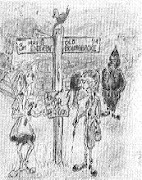
Well, I've learned how to get more hits on this blog. Just mention Ewa Sonnet. Haha, got you again.
Because I want to talk about books.
Yesterday I began reading Hardy’s Far from the Madding Crowd. I read the first chapter on the bus and wondered why I had enjoyed it so much, and why it wasn't just pleasure the book was giving me.
It was also relief. And what relief to begin an old-fashioned, well-written novel. The long, rolling sentences, interwoven with spare, fresh dialogue. Lots of interesting characters, just the right side of exaggeration, described with understanding and a touch of humour.
For example, I love this little description of Bathsheba’s companion, Liddy:
‘Liddy, like a little brook, though shallow, was always rippling; her presence had not so much weight as to tax thought, and yet enough to exercise it.’
Nineteenth century novelists weren’t afraid of complicated stories, coincidence, long words, classical allusions, elegant style, narative omniscience and authorial comment.
I love it.
What a contrast with what I’ve been reading. OK, Graham Greene’s Monsignor Quixote was well-written, entertaining and thoughtful, but ultimately a dramatised debate about different kinds of faith, religious and political. Therefore, rather irrelevant and slight.
Diane Setterfield’s The Thirteenth Tale was laboured and derivative. There was the one whose title I’ve forgotten about the old girl who’s released from a mental home after 60 years into the care of a niece and the relationship which develops. I enjoyed it at the time but in retrospect it was just a two-hander, rather like a TV play in comparison with a movie. And after a while, a novel written in the present tense becomes a bit wearing.
So does the first person. I’ve said before that authors like Chandler and Wodehouse pulled off the first person novel expertly. Nick Hornby isn’t bad, but the characters he creates to tell the story are ultimately a bit boring. And so often the technique seems merely an excuse for poor writing and lack of intelligence. Why doesn’t the author adopt a persona who knows how to string a sentence together and has a broader vocabulary than four-letter words?
Ted Lewis (Jack’s Return Home) for example; Trainspotting; The Pornographer Diaries. I call it ‘scrotelit’.
In the same vein is The Damned United, by David Peace. It’s the story of Brian Clough’s brief and disastrous stint as manager of Leeds United, a club he had always hated. Inasmuch as it tries to get into his mind as he faces each day there and contrasts it with the joy he had previously found as manager of Derby, it is fascinating.
But. But it is written in a pseudo-poetical style, the main technique being repetition. Repetition. Repetition. After a while, it gets boring, boring. Boring. And so, so, so irritating. It really got on my nerves. Got on my nerves.
So, back to Thomas Hardy, where ‘The scarlet and the orange light outside the malthouse did not penetrate to its interior, which was, as usual, lighted by a rival glow of similar hue, radiating from the hearth.’
It was also relief. And what relief to begin an old-fashioned, well-written novel. The long, rolling sentences, interwoven with spare, fresh dialogue. Lots of interesting characters, just the right side of exaggeration, described with understanding and a touch of humour.
For example, I love this little description of Bathsheba’s companion, Liddy:
‘Liddy, like a little brook, though shallow, was always rippling; her presence had not so much weight as to tax thought, and yet enough to exercise it.’
Nineteenth century novelists weren’t afraid of complicated stories, coincidence, long words, classical allusions, elegant style, narative omniscience and authorial comment.
I love it.
What a contrast with what I’ve been reading. OK, Graham Greene’s Monsignor Quixote was well-written, entertaining and thoughtful, but ultimately a dramatised debate about different kinds of faith, religious and political. Therefore, rather irrelevant and slight.
Diane Setterfield’s The Thirteenth Tale was laboured and derivative. There was the one whose title I’ve forgotten about the old girl who’s released from a mental home after 60 years into the care of a niece and the relationship which develops. I enjoyed it at the time but in retrospect it was just a two-hander, rather like a TV play in comparison with a movie. And after a while, a novel written in the present tense becomes a bit wearing.
So does the first person. I’ve said before that authors like Chandler and Wodehouse pulled off the first person novel expertly. Nick Hornby isn’t bad, but the characters he creates to tell the story are ultimately a bit boring. And so often the technique seems merely an excuse for poor writing and lack of intelligence. Why doesn’t the author adopt a persona who knows how to string a sentence together and has a broader vocabulary than four-letter words?
Ted Lewis (Jack’s Return Home) for example; Trainspotting; The Pornographer Diaries. I call it ‘scrotelit’.
In the same vein is The Damned United, by David Peace. It’s the story of Brian Clough’s brief and disastrous stint as manager of Leeds United, a club he had always hated. Inasmuch as it tries to get into his mind as he faces each day there and contrasts it with the joy he had previously found as manager of Derby, it is fascinating.
But. But it is written in a pseudo-poetical style, the main technique being repetition. Repetition. Repetition. After a while, it gets boring, boring. Boring. And so, so, so irritating. It really got on my nerves. Got on my nerves.
So, back to Thomas Hardy, where ‘The scarlet and the orange light outside the malthouse did not penetrate to its interior, which was, as usual, lighted by a rival glow of similar hue, radiating from the hearth.’

No comments:
Post a Comment